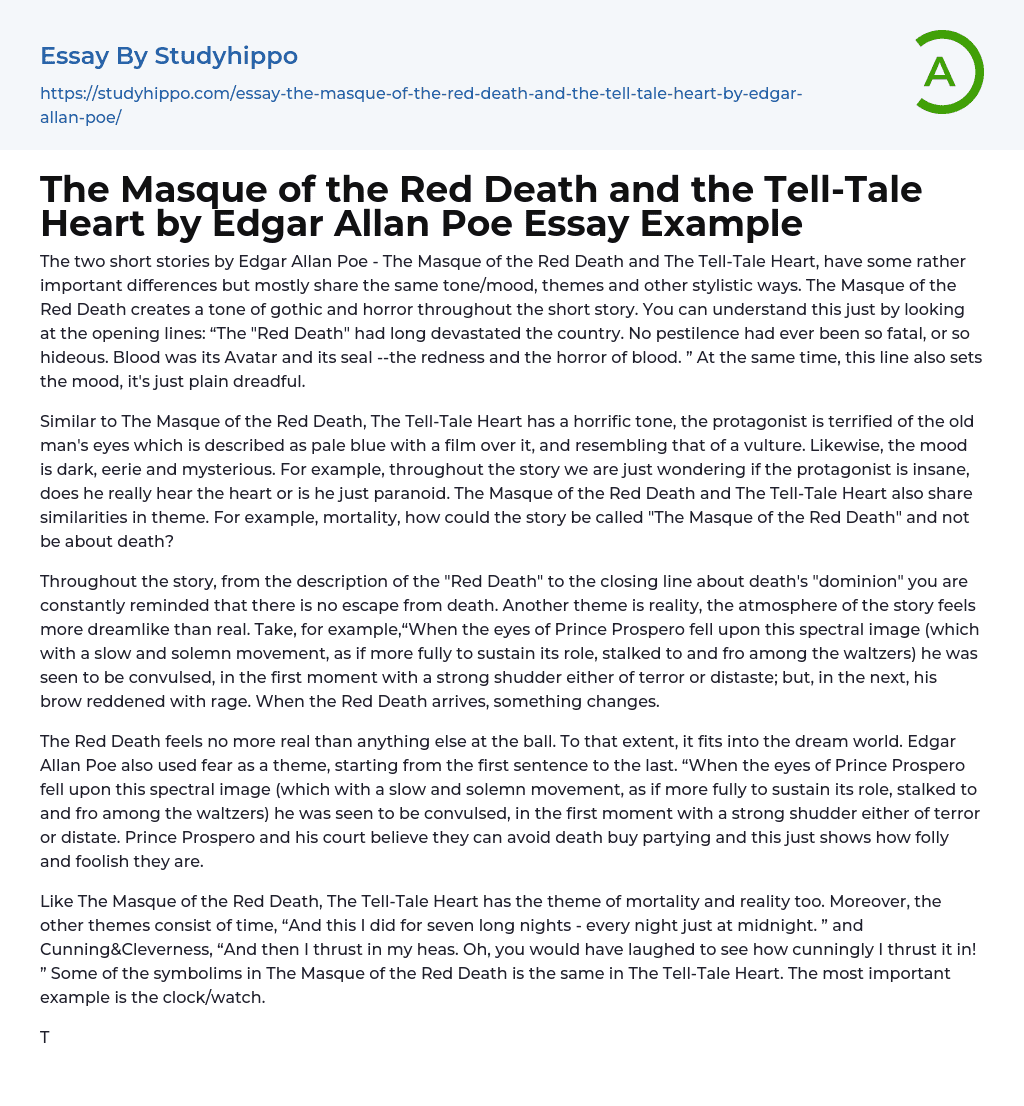

The Masque of the Red Death and the Tell-Tale Heart by Edgar Allan Poe Essay Example
The two short stories by Edgar Allan Poe - The Masque of the Red Death and The Tell-Tale Heart, have some rather important differences but mostly share the same tone/mood, themes and other stylistic ways. The Masque of the Red Death creates a tone of gothic and horror throughout the short story. You can understand this just by looking at the opening lines: “The "Red Death" had long devastated the country. No pestilence had ever been so fatal, or so hideous. Blood was its Avatar and its seal --the redness and the horror of blood. ” At the same time, this line also sets the mood, it's just plain dreadful.
Similar to The Masque of the Red Death, The Tell-Tale Heart has a horrific tone, the protagonist is terrified of the old man's eyes which
...is described as pale blue with a film over it, and resembling that of a vulture. Likewise, the mood is dark, eerie and mysterious. For example, throughout the story we are just wondering if the protagonist is insane, does he really hear the heart or is he just paranoid. The Masque of the Red Death and The Tell-Tale Heart also share similarities in theme. For example, mortality, how could the story be called "The Masque of the Red Death" and not be about death?
Throughout the story, from the description of the "Red Death" to the closing line about death's "dominion" you are constantly reminded that there is no escape from death. Another theme is reality, the atmosphere of the story feels more dreamlike than real. Take, for example,“When the eyes of Prince Prospero fell upo
this spectral image (which with a slow and solemn movement, as if more fully to sustain its role, stalked to and fro among the waltzers) he was seen to be convulsed, in the first moment with a strong shudder either of terror or distaste; but, in the next, his brow reddened with rage. When the Red Death arrives, something changes.
The Red Death feels no more real than anything else at the ball. To that extent, it fits into the dream world. Edgar Allan Poe also used fear as a theme, starting from the first sentence to the last. “When the eyes of Prince Prospero fell upon this spectral image (which with a slow and solemn movement, as if more fully to sustain its role, stalked to and fro among the waltzers) he was seen to be convulsed, in the first moment with a strong shudder either of terror or distate. Prince Prospero and his court believe they can avoid death buy partying and this just shows how folly and foolish they are.
Like The Masque of the Red Death, The Tell-Tale Heart has the theme of mortality and reality too. Moreover, the other themes consist of time, “And this I did for seven long nights - every night just at midnight. ” and Cunning&Cleverness, “And then I thrust in my heas. Oh, you would have laughed to see how cunningly I thrust it in! ” Some of the symbolims in The Masque of the Red Death is the same in The Tell-Tale Heart. The most important example is the clock/watch.
The big, black, creep clock in Masque of the Red Death
is located in the black room, so it is not hard to guess that it is meant to be a symbol of death and that time flies away. Similarly, in The Tell-Tale Heart, each tick of the watch symbolizes a movement closer to the inevitable death that all humans face. In conclusion, even though the two short stories have their differences, the fundamental message of the author is the same. Both stories are about the dark side of life - disease, guilt, murder ect. The protagonists believe they can overcome these forces and emerge victiorious but one dies and the other goes insane.
- Aldous Huxley essays
- Alice Walker essays
- Amy tan essays
- Anne Bradstreet essays
- Anton Chekhov essays
- Arthur Miller essays
- Augustine essays
- Bertolt Brecht essays
- Booker T Washington essays
- Carol ann duffy essays
- Charles Dickens essays
- Charlotte Perkins Gilman essays
- Chinua Achebe essays
- Christina Rossetti essays
- Consider The Lobster essays
- Edgar Allan Poe essays
- Elizabeth Bishop essays
- Emily Dickinson essays
- Ernest Hemingway essays
- F. Scott Fitzgerald essays
- George Orwell essays
- Harper Lee essays
- Homer essays
- James Baldwin essays
- Jane Austen essays
- John Donne essays
- John Steinbeck essays
- Kate Chopin essays
- Kurt Vonnegut essays
- Langston Hughes essays
- Leonardo Da Vinci essays
- Mark Twain essays
- Mary Shelley essays
- Maya Angelou essays
- Nathaniel Hawthorne essays
- Oscar Wilde essays
- Percy Bysshe Shelley essays
- Peter Skrzynecki essays
- Phillis Wheatley essays
- Poets essays
- Ralph Waldo Emerson essays
- Ray Bradbury essays
- Richard Rodriguez essays
- Robert Browning essays
- Robert Frost essays
- Robert Louis Stevenson essays
- Seamus Heaney essays
- Sherman Alexie essays
- Sophocles essays
- Stephen King essays



